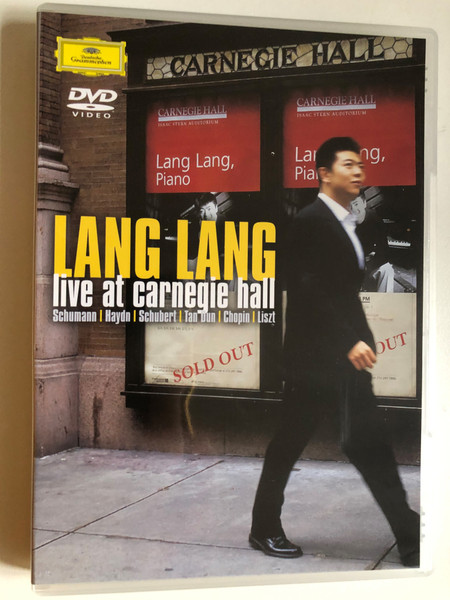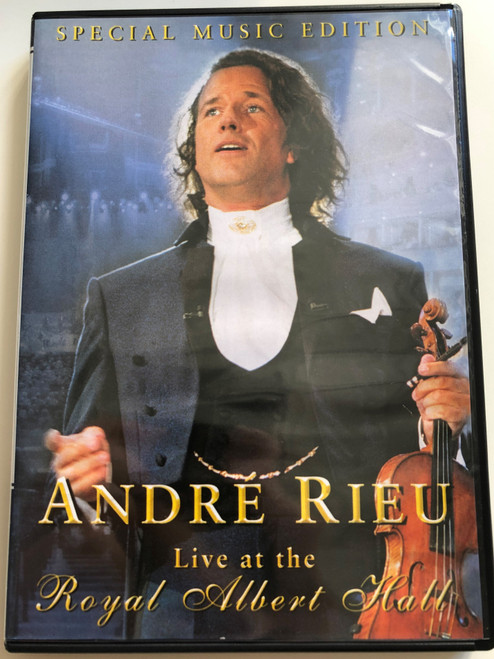Product Overview
Lang Lang: Live at Carnegie Hall / Schumann - Haydn - Schubert - Tan-Dun - Chopin - Liszt / Director: Benedict Mirow / Producer: Manfred Frei / Recorded live at Carnegie Hall, New-York on November 7, 2003 / DVD
Format: NTSC
Run time: 142 Minutes
UPC: 044007309896
- Aspect Ratio : 1.33:1
- Is Discontinued By Manufacturer : Yes
- MPAA rating : NR (Not Rated)
- Product Dimensions : 0.7 x 7.5 x 5.4 inches; 0.01 Ounces
- Item model number : 1909779
- Director : Benedict Mirow
- Media Format : Multiple Formats, AC-3, Closed-captioned, Color, Dolby, Classical, NTSC, Subtitled, DTS Surround Sound
- Run time : 2 hours and 17 minutes
- Release date : September 28, 2004
- Actors : Lang Lang
- Subtitles: : Chinese, French, German, Spanish
- Language : English (Dolby Digital 5.1), English (Dolby Digital 2.0), Unqualified (DTS ES 6.1), English (DTS 5.1)
- Studio : Deutsche Grammophon
- Number of discs : 1
Acclaimed pianist Lang Lang performs before an audience at the world-famous Carnegie Hall in this release from Deutsche Grammophon. Recorded on November 7, 2003, Lang Lang: Live at Carnegie Hall includes renditions of Schumann's Abegg-Variationen, Haydn's Piano Sonata in C Major Hob. XVI:50, Schubert's Wanderer-Fantasie, Dun's Eight Memories in Watercolor, Op. 1, Chopin's Nocturne in D Flat Major, Op. 27 No. 2, Liszt's Reminiscences du Don Juan de Mozart, and three others.
This is a dazzling recital, taped live at Carnegie Hall in November 2003--complete with applause. Lang Lang's virtuosity is almost frightening: the Liszt "Reminiscenses du Don Juan" is a showpiece when played "normally." Here, Lang plays it to its extremes, with soft passages amazingly soft and subtly delineated and the bigger moments heaven-thundering. And it is played so fast, and so accurately (a cascade of notes in mid-"La ci darem la mano" sounds like a waterfall), that it leaves the listener breathless--surely just what Liszt wanted. In a Haydn sonata, Lang's classical line is impeccable, but he's not afraid to shine through the music and embellish occasionally. The Schumann "Traumerei" is suitably dreamy and hushed; Schubert's "Wanderer" Fantasy, a real crowd-pleaser, is just that--beautifully played, familiar yet fresh sounding. And an encore, with Lang's father playing a two-string fiddle called the erhu, is a fascinating look into Eastern music. There's more (this is a 2-CD set), and it's stunning--and highly recommended for all admirers of great piano playing.
Releasing a recording of a live concert always involves an element of risk, one that has largely paid off in this latest recording by Lang Lang for DG. There is some really fine music making going on here, offering evidence of both a big technique and a big heart behind the flashing finger work; but at the same time it’s also clear that more work needs to be done before a firm artistic profile emerges. First though, let me say that there’s a world of difference between this solo recital and Lang Lang’s soggy, unimpressive recent coupling of piano concertos by Tchaikovsky and Mendelssohn. The range of repertoire here, from Haydn to Tan Dun, is as impressive as the technical ease with which Lang Lang plays it all, sounding as fresh by the evening’s end as he does at its opening.
Perhaps it’s not too surprising that the youthful pieces come off best: Schumann’s Abegg Variations (the composer’s Op. 1) have sparkle, swagger, and spontaneity, and each episode is characterized without sounding excessively worked over. Schubert’s Wanderer Fantasie requires both a big technique and no little musical intelligence, and Lang Lang clearly has both, relating each section organically to what has come before, treating the scherzo with a mercurial sense of fantasy and beginning the fugue imposingly but without banging. He has a tendency to clip phrases a bit at the opening, and you won’t (for example) find Richter’s remarkable ability to bend a phrase while retaining absolute rhythmic continuity, but in all other respects this is one hell of a performance. Tan Dun’s Eight Memories in Watercolor also is his Op. 1, and it’s big on charm and represents an appealing novelty.
A bit more on the down-side is Chopin’s Nocturne in D-flat Op. 27 No. 2, which comes off as both flat and labored next to the effortless fluidity of artists such as Rubinstein and Arrau. Liszt’s Reminiscences du Don Juan de Mozart offers thrills aplenty, but Lang Lang’s overall shaping of the work fails to convince. Perhaps Liszt’s invitation to feats of technical prowess encourages a more “climax oriented” approach, but the central variations aren’t as gracefully shaped as they could be–too much Liszt and not enough Mozart. The Haydn Sonata is frankly a mess, with all kinds of precious mannerisms in dynamics and phrasing that seem unrelated to the music at hand. In the first movement, the constant alternations of loud and soft, stop and go, rapidly become tiring; and in the finale Lang Lang’s habit of telescoping Haydn’s harmonic surprises misses every possible opportunity for humor in a movement that consists of little else.
The encores consist of a rather droopy Schumann Träumerei and a jolly little piece called Horses, in which Lang Lang accompanies his father Lang Guo-ren on the erhu. Finally, against an unfortunate amount of audience noise, the disc concludes with an absolutely magical Liszt Liebestraum No. 3, a performance that proves that Lang Lang has the ability to be both a virtuoso and a colorist. He should cultivate this aspect of his artistry assiduously.
The concert itself ended with one more piece: Horowitz’s transcription of The Stars and Stripes Forever, which DG has wisely omitted, leaving us with a wholly positive impression of an artist with the potential to do great things. The audience is mostly very quiet (save as noted during the encores), and the piano sound is typically close, rendering Lang Lang’s tone harder than it must have sounded live. Still, this production does prove that there’s far more to this pianist than mere hype, and taken as whole it documents what obviously was a very enjoyable musical evening for all concerned.









